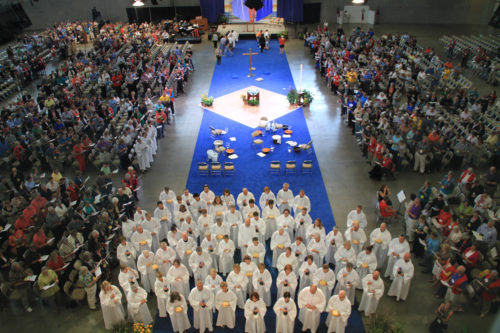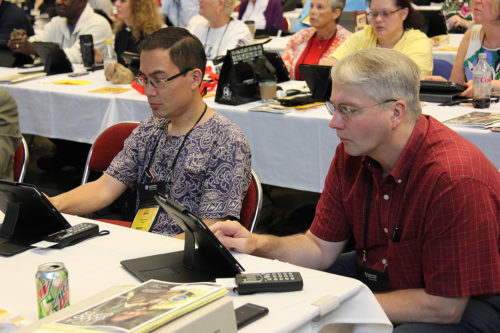ELCA approves Israel/Palestine proposals, statement on criminal justicePosted Aug 19, 2013 |
|

Participants in the Evangelical Lutheran Church in America’s 2013 Churchwide Assembly gather in the David L. Lawrence Convention Center August 14 for Eucharist. Photo: ELCA News Service
[Episcopal News Service] The Evangelical Lutheran Church in America (ELCA), saying it is committed to supporting a peaceful resolution to the conflict between Israel and Palestine, affirmed that commitment during the recently concluded 2013 ELCA Churchwide Assembly in Pittsburgh.
The churchwide assembly, the chief legislative authority of the ELCA, met Aug. 12-17 at the David L. Lawrence Convention Center. The theme for the assembly was “Always being made new.” This year marks the ELCA’s 25th anniversary.
Voting members considered a series of proposals — known as memorials — from the ELCA’s 65 synods. With an 812 to 45 vote, voting members approved a memorial designed to continue this church’s awareness-building, accompaniment and advocacy on behalf of peaceful resolutions in the Middle East.
The action commits the ELCA to learning more about the experiences of both Palestinians and Israelis and their mutual fears, aspirations and hopes; work to convey the concerns and perspectives of Israelis and Palestinians that dispel stereotypes and caricatures and promote better understanding; lift up the voices within both communities, especially those of victims of violence, that seek peace with justice through nonviolent responses to the conflict; continue to help alleviate the humanitarian needs; support U.S. funding that promotes peace and cooperation for all parties; and to continue to pray for brothers and sisters in the Middle East and for the Evangelical Lutheran Church in Jordan and the Holy Land.
The action also calls for evaluating possibilities for investing in specific Palestinian economic endeavors and other projects that would promote peace and cooperation between Israelis and Palestinians; and to provide a report with recommendations to the April 2014 meeting of the ELCA Church Council.
The assembly received greetings from the Rev. Munib A. Younan, president of the Lutheran World Federation and bishop of the Evangelical Lutheran Church in Jordan and the Holy Land; Rabbi Steve Gutow, president and CEO, Jewish Council for Public Affairs; and Dr. Tarunjit Singh Butalia, former secretary General, World Sikh Council – American Region.
Prior to the churchwide assembly, ELCA Presiding Bishop Mark S. Hanson joined 29 other Christian, Jewish and Muslim leaders in a letter to Secretary of State John Kerry welcoming his “announcement on July 19 that agreement has been reached ‘that establishes the basis for resuming direct final status negotiations between the Palestinians and the Israelis.'” The leaders said they “are committed to mobilizing broad public support for active, fair and firm U.S. leadership for peace,” offered their prayers for his efforts and said they are prepared “to activate members of synagogues, churches and mosques across the country to support bold American leadership.
Other memorial topics considered at the 2013 ELCA Churchwide Assembly included:
- Addressing community violence. With a 834 to 41 vote, the assembly moved to encourage ELCA members, consistent with their consciences, to contact their elected officials and advocate for passage of legislation that promotes universal background checks, prevents gun trafficking and requires the reporting of lost or stolen guns to law enforcement so that violence in communities might decrease. In its action, voting members also moved to lift up the ELCA social messages on suicide prevention, community violence, and mental health and to call upon congregations and synods to engage their members on ways to prevent suicide.
- Comprehensive immigration reform. The assembly approved with an 828 to 40 vote to advocate for the adoption of comprehensive immigration reform legislation that supports an earned pathway to lawful permanent residency and eventual citizenship; ensure humane and just enforcement of U.S. immigration laws; protect families from separation; provide resources and protections to integrate of refugees and others; and to ensure the protection of U.S. citizen and migrant workers. The action included a call to ELCA rostered leaders to promote an understanding of welcome; encourage congregations to engage in prayerful, reasoned discussion and education about immigration; call on the ELCA presiding bishop to continue communication with members of U.S. Congress on reform. In a separate but related action, the assembly moved to declare Sunday, June 22, 2104 as “Refugee Sunday.”
- Communion practices. With a 688 to 193 vote, the assembly requested a process to review the ELCA’s guiding documents on communion practices and to bring a report and possible recommendations to the April 2014 meeting of the ELCA Church Council. Through its action, the assembly also invited congregations, synods and the churchwide organization into conversation and study on the Use of the Means of Grace: A Statement on the Practice of Word and Sacrament.
- Same-gender couples and their families. The assembly approved with an 825 to 68 vote to affirm the church’s commitment to ensuring pastoral care for same-gender couples and their families — a commitment outlined in the ELCA social statement “Human Sexuality: Gift and Trust.” The commitment recognizes “familial relationship as central to nurturing and sustaining trust and security in human relationships and to advocate for public policies that support and protect families.” The action invites and encourages conversation in this church on changing family configurations and their impact on society and the ministry of this church, and it requests the authorization of a group to explore this and bring a report and possible recommendations to the 2014 fall meeting of the ELCA Conference of Bishops and Church Council regarding next steps in carrying out the commitment to pastoral care for same-gender couples and their families.
With a 787 to 41 vote, the assembly approved memorials en bloc on topics addressing fossil fuels, hydraulic fracturing, immigration detention, gender identity discrimination and the Uniting American Families Act.
In other action, the assembly:
- approved the ELCA’s 12th social statement titled “The Church and Criminal Justice: Hearing the Cries.” The call for a statement on criminal justice emerged from concern among ELCA members over the “massive levels of incarceration in the United States,” said Cynthia Osbourne, chair of the ELCA task force charged with leading a study about criminal justice and the development of a proposed social statement for the churchwide assembly to consider. The statement affirms the fundamental principles of the U.S. criminal justice system and it also recognizes serious deficiencies, which is said include overly harsh sentencing and persistent inequalities based on race and class. It calls ELCA members to recommit themselves to visiting the prisoner; correct the flawed criminal justice system; participate in God’s work with hands and hearts and to hear the cries of people affected. ELCA social statements are teaching documents that assist members in forming judgments on social issues. They set policy for this church and guide its advocacy and work as a public church.
- approved 671 to 242 a proposal for the ELCA’s first major fundraising campaign. The five-year campaign, to begin in 2014, is designed to increase the church’s capacity to renew and start new congregations, educate and develop its leaders, bolster

Two of the 952 voting members of the Evangelical Lutheran Church in America’s 2013 Churchwide Assembly utilize their electronics Guidebook during an Aug. 17 plenary. Photo: ELCA News Service
its global mission efforts and expand the impact of its relief and development work. Voting members thanked ELCA members for their ongoing stewardship and support of ministry across the church and invited congregations, synods, related ministies and individual members to contribute in order to achieve its goal of $198 million. They requested that the ELCA Church Council monitor and evaluate the implementation of the campaign with annual reports to the council and to each assembly through the completion of the campaign. They encouraged conversations across the church on ways that the campaign can be implemented to take advantage of synergies among all expressions of the church, and to “thank God for 25 years of interdependent ministry in the ELCA and to step forward boldly in order to seek to reach more communities with the good news of Jesus Christ, train more leaders who will become missionaries, pastors and lay leaders and contribute to the alleviation of hunger and poverty.” The assembly said that the campaign must also encourage, recognize and form lay youth and young adult leaders, and added $4 million to the campaign goal to meet this priority. Another amendment added a $4 million stretch goal for disability ministry.
- elected the Rev. Elizabeth Eaton as its first female presiding bishop.
- heard greetings from Episcopal Church Presiding Bishop Katharine Jefferts Schori.
For the first time at a churchwide assembly, the 952 voting members used tablets to receive and organize all of their legislative materials. The so-called Guidebook was available as an application for members with iPads and iPhones, Android tablets or Amazon Kindle Fires. Those members who did not own a tablet were provided with a free rental device. The church estimated that it saved 500,000 pages of paper. The Episcopal Church’s General Convention Office has said that during the 2015 gathering laptops, tablets, smartphones, and video monitors will be the primary media of legislative materials, and for the first time, there will be no large, dedicated print shop.
The ELCA has more than 4 million members in nearly 10,000 congregations across the 50 United States and in the Caribbean region. The church was formed from three separate then-existing churches: the American Lutheran Church, the Association of Evangelical Lutheran Churches, and the Lutheran Church in America.
— The ELCA News Service contributed to this report.

Social Menu